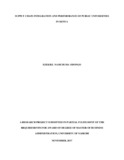| dc.description.abstract | This study sought to establish the extent of supply chain integration in public universities and the relationship between supply chain integration and firm performance. A descriptive survey was employed, with a census of the 31 public universities being carried out. Questionnaires were administered to 31 respondents who managed supply chain, procurement and operations in the universities under survey. Frequencies, descriptive statistics and multiple regression analysis were used to analyze the data. With a survey response rate of 80.65%, the universities under study were found to have integrated their supply chains to a great extent. Specific elements of supply chain integration in the universities include customer, supplier and internal integration. Each of these forms of integration were found to involve a great extent of information and resource sharing with supply chain partners, collaboration in the execution of operations related tasks and interfirm linkages in information systems. The benefits found to have accrued following supply chain integration were increased responsiveness to dynamic customer needs and preferences resulting into high levels of customer satisfaction, reduction in resource requirements in task execution and by implication operating costs, alongside a host of other effects. A strong correlation was found between the extent of supplier, customer and internal integration and the performance of the surveyed firms. This was further affirmed by the coefficient of determination, R square. The R square was found to be 0.667, suggesting that 66.7% of the variation in the opinion on the extent of benefits from supply chain integration from respondent to respondent arose from the variation in the opinion on the extent of supply chain integration. The regression model obtained was found to be significant indicating that the relationship between supply chain integration and performance of the surveyed universities was a significant one. However, the regression coefficients were not significant. Future studies may employ quantitavely measured variables in attempting to discover relationships underlying supply chain integration and firm performance. | en_US |



